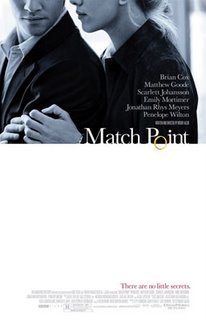
Match Point
To begin with, there is really nothing in this movie to identify it as a Woody Allen picture, except possibly the distinctive opening credits. If I hadn't known before hand I would have been shocked upon learning the director. Towards the end of last year I made an effort to get over my loathing of Allen and watch some of his lesser works. I had seen some of the majors (Crimes and Misdemeanors, Manhattan, Annie Hall) and a few of the minors (Deconstructing Harry, Mighty Aphrodite, Sweet and Lowdown) and had pretty well liked all of them, but I still found myself immediately shuddering at the prospect of watching one of his movies. When I realized it was mostly because he was in them I was able to look past that initial reaction and enjoy the movies for what they were, well made and cleverly scripted affairs that were worth a few enjoyable laughs. Anyway, on to Match Point...
It would appear that Allen has gotten wise to the fact that he can no longer (if he ever could) believably portray the characters he routinely plays by not appearing in his last two pictures. Ferrell's role in Melinda and Melinda is the prototypical Allen part, but he wisely chose to let Ferrell take the role instead of forcing us to suspend a ridiculously large amount of disbelief once again and accept him as the neurotic husband of an attractive (and much younger) woman. Now it appears he's content not only to continue to make "Woody Allen" movies solely from behind the camera, but that he's also ready to stay behind the camera for good and focus on stories and characters with no chance whatsoever for him to be involved with. And it works. Match Point follows two high society outsiders as they manage to work their seperate ways into the largesse of a wealthy British family. Nola (Johansson) is a struggling actress who winds up engaged to the son of the family while Chris (Rhys-Myers) is the tennis pro who parlays his charm and work ethic into a marriage with the family's daughter and the esteem of her very wealthy parents. Both become accustomed to the good life their fortuitous pairings have afforded but find themselves in lust with each other. It seemed to me neither one had a chance in their situations. Neither has any particular dreams or aspirations: Nola "wants to be an actress," but mostly she just doesn't want to go back to Colorado and her alcoholic mother, while Chris just doesn't want to be poor anymore. The only concrete goal either one has ever had stems from their lust for one another, a fleetingly rewarding goal at best, but one that can be obtained quickly and without effort instead of from doing the right thing by their respective others and reaping the rewards for the rest of their lives. Maybe neither one has a real reason for wanting the good life, it's just that the good life is what people are supposed to want, and that causes them to succumb to the grass is greenerism that plenty of couples have struggled with over time. Probably it's because the "right" thing is never reinforced by the strongest emotions available: Chris's lust for Nola is a stronger and more immediate feeling than his gratitude to his wife's family. The right thing for him to do is ignore the lust, take care of his wife, and get on with his life but instead he cannot get over the strength of his desire for Nola and he chooses the darker path to the detriment of all. It's ultimately a very sad movie. The trailers play up the "we don't want to acknowledge the role that luck plays in our lives" aspect of the movie, but what it came down to for me was the role that morals and wise choices play into how we let luck affect us. Everyone can blame something on bad luck because it's easy, but all of us, when we really look long and hard enough can also see where we made that bad luck for ourselves.


0 Comments:
Post a Comment
<< Home